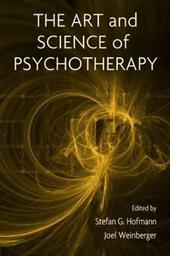
|
The Art and Science of Psychotherapy
Hardback
Main Details
| Title |
The Art and Science of Psychotherapy
|
| Authors and Contributors |
Edited by Stefan G. Hofmann
|
|
Edited by Joel Weinberger
|
|
Foreword by D.H. Barlow
|
| Physical Properties |
| Format:Hardback | | Pages:340 | | Dimensions(mm): Height 229,Width 152 |
|
| ISBN/Barcode |
9780415952156
|
| Classifications | Dewey:616.8914 |
|---|
| Audience | | Undergraduate | | Postgraduate, Research & Scholarly | | Professional & Vocational | |
|---|
| Illustrations |
15 black & white tables, 3 black & white line drawings
|
|
Publishing Details |
| Publisher |
Taylor & Francis Ltd
|
| Imprint |
Routledge
|
| Publication Date |
9 February 2007 |
| Publication Country |
United Kingdom
|
Description
Psychotherapy, like most other areas of health care, is a synthesis of scientific technique and artistic expression. The practice, like any other, is grounded in a series of standardized principles, theories, and techniques. Individual practitioners define themselves within the field by using these basic tools to achieve their therapeutic goals in novel ways, applying these rudimentary skills and guiding principles to each situation. However, a toolbox full of treatment approaches, no matter how comprehensive, is not enough to effectively reach your patients. Effective work can only be accomplished through a synthesis of the fundamental scientific methods and the creative application of these techniques, approaches, and strategies. The Art and Science of Psychotherapy offers invaluable insight into the creative side of psychotherapy. The book addresses the fundamental split between researchers and scholars who use scientific methods to develop disorder-specific treatment techniques and those more clinically inclined therapists who emphasize the individual, interpersonal aspects of the therapeutic process. With contributions from leading therapists, the editors have compiled a practical handbook for clinical psychologists, social workers, psychiatrists, and mental health professionals.
Author Biography
Stefan G. Hofmann, Ph.D., is an Associate Professor of Psychology at the Department of Psychology at Boston University and the director of the social anxiety program at the Center for Anxiety and Related Disorders. Joel Weinberger, Ph.D., is a Professor of Psychology at the Department of Psychology at Adelphi University.
Reviews"The extraordinary overview of the present-day status of research in psychotherapy contained in "The Art and Science of Psychotherapy" is a unique, updated, profoundly informative and sobering analysis of where research in psychotherapy stands at this point." - Otto F. Kernberg, M.D., Professor of Psychiatry, Weill Medical College of Cornell University "In this book leading researchers, theorists, and practitioners confront and attempt to disentangle some of the key issues of psychotherapy, particularly the role of science and clinical experience in knowledge formation that is to inform practice and research. The editors should be congratulated for confronting these fundamental and important problems facing our field." - William T. O'Donohue, Ph.D., Department of Psychology, University of Nevada, Reno "This timely volume bridges the gap between science and practice, and will be of great interest to clinicians, students, and researchers with an interest in psychotherapy, regardless of theoretical orientation." - Martin M. Antony, Ph.D., ABPP, Professor of Psychology, Ryerson University, Toronto "This is a truly impressive volume. Hofmann and Weinberger have tackled one of the perennial struggles in clinical psychology between science and art, and have produced a synthetic approach that respects the contributions of both perspectives." - Michael Addis, Ph.D., Chair of Psychology, Clark University "Hofmann and Weinberger have done a marvelous job of enticing chapter authors who know both science and practice to contribute. The result is a volume that demonstrates that art and science are not incompatible, as many claim. Indeed, the reader will see how each plays off the other and how the two epistemologies can work toward what we all desire: better outcomes for patients." - Bruce E. Wampold, Ph.D., ABPP, Professor of Counseling Psychology, University of Wisconsin, Madison
|